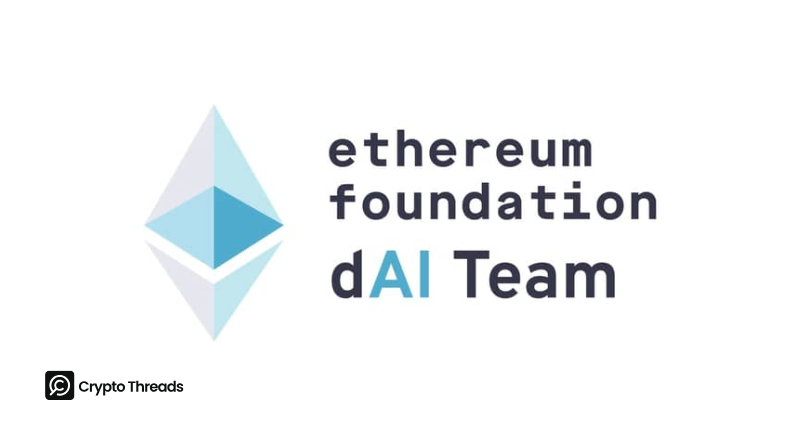Ethereum Foundation Launches AI Research Team to Build Decentralized AI Economy
The Ethereum Foundation is diving into artificial intelligence with a dedicated research team to merge blockchain’s decentralized infrastructure with the fast-growing world of AI.
- The initiative builds on ERC-8004, which expands agent-to-agent (A2A) protocols for AI trust and discovery.
- Ethereum aims to become a neutral settlement layer for intelligent AI agents to transact securely.
- Foundation is hiring an AI researcher and project manager to accelerate development.
- Rising onchain activity, with 12M daily smart contract calls, underscores Ethereum’s expanding role in programmable settlements.
The Ethereum Foundation has announced the creation of a dedicated artificial intelligence research team to explore how blockchain technology can power a decentralized AI economy. Research scientist Davide Crapis, who will lead the group, said the goal is to develop both an AI economy on Ethereum and a decentralized AI stack that developers can use to build applications free from centralized control. According to Crapis, Ethereum provides a censorship-resistant base layer for value and reputation, while AI brings new utility to Ethereum by enabling intelligent agents to interact and transact across the network.
The initiative expands on earlier work around ERC-8004, a proposal crafted by Crapis along with Marco De Rossi and Jordan Ellis. ERC-8004 is designed to extend the agent-to-agent protocol into a trust layer that allows AI agents to discover and interact with each other securely. AI agents are autonomous programs capable of making decisions and executing transactions with minimal human oversight, and Ethereum’s programmable smart contracts provide an ideal environment for these interactions.
A research scientist with the Foundation said on Monday. Source: Davide Crapis on X
To accelerate the effort, the Ethereum Foundation is staffing its newly named dAI team and is currently seeking an AI researcher and project manager to coordinate projects and community collaboration. The team will support external initiatives aimed at integrating AI with Ethereum, creating an ecosystem where humans and AI can interact on equal, decentralized footing.
The move comes as interest in blending blockchain and AI grows across the industry. AI can improve blockchain settlements by helping manage and finalize complex transactions, while blockchain enhances AI by offering decentralization, immutability, and identity verification. Recent data from CryptoQuant highlights Ethereum’s suitability for this convergence: daily smart contract calls reached 12 million on Thursday, and total transactions and active addresses continue to hit record highs, signaling broad adoption across DeFi, stablecoins, and token activity.
Other projects have also been exploring the AI-blockchain intersection. Matchain launched its decentralized AI blockchain in 2024, and KiteAI followed in early 2025 with an AI-driven network on Avalanche. Experts such as Arunkumar Krishnakumar of Kamino Finance believe AI agents combined with blockchain infrastructure could fundamentally reshape the digital economy, creating new ways for autonomous systems to interact and trade value without centralized gatekeepers.
Final Thought
By investing in a decentralized AI research team, the Ethereum Foundation is positioning its network as a core settlement and coordination layer for intelligent agents, laying the groundwork for an open AI economy built on trustless blockchain technology.



